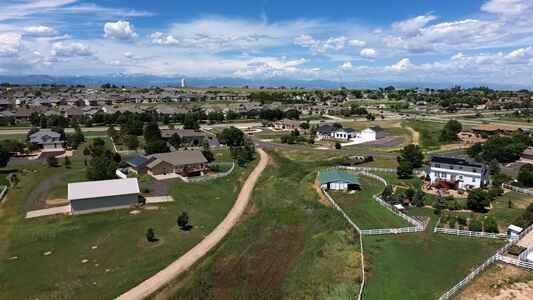Nestled across 750 acres in Adams County, Colorado, Todd Creek Farms once embodied idyllic rural-suburban living—370 custom lots, equestrian trails, and modern amenities governed by a volunteer HOA board. But beneath the manicured landscapes, a storm brewed. What started as a routine landscaping contract with Method Landscaping Services in 2022 spiraled into allegations of self-dealing, board misconduct, and financial hemorrhage. By November 2025, the HOA’s filing for Chapter 11 bankruptcy has transformed a local governance dispute into a landmark case for Colorado homeowners associations.
The Spark: A Controversial Landscaping Contract

The crisis ignited in November 2022 when two board members resigned abruptly. The remaining trio—led by President Jason Pardikes—allegedly executed an “illegal swap of terms,” extending Pardikes’ tenure by two years without an election, violating HOA bylaws and Colorado Revised Statutes § 7-128-401 on fiduciary duty.
Residents, already questioning the $219,000+ landscaping deal, demanded financial records. Lead plaintiff Edie Apke and others suspected undisclosed ties between Pardikes and Method Landscaping. Though Method’s principal denied in an affidavit that Pardikes received benefits, transparency demands went unmet, fueling distrust.
The Lawsuit: A Derivative Action for Accountability
In 2023, Apke and 20 homeowners filed a derivative lawsuit (Case No. 23CV30537, Adams County District Court) on behalf of the HOA against the board—Pardikes, Wendi Setchfield, Maryo Montoya, Ben Cooper, and Sean Holdren.
Key Allegations:
- Breach of fiduciary duty via undisclosed profits (over $150,000 claimed)
- Refusal to disclose financial records
- Illegal lien placed on Apke’s property (later reversed by court order, May 2025)
- Unauthorized board actions and election violations
Attorney Peter Towsky of Robinson & Henry, P.C., argued: “You cannot benefit from a third-party contractor without disclosure.” The board countered that the suit was baseless and driven by a disruptive minority.
Judicial Milestones: From Denial to Receivership
- May–June 2023: Motions to dismiss filed; later mooted.
- February 2024: Court denies dismissal, allowing discovery.
- September 2024: Receiver appointed under C.R.C.P. 66(a) to oversee operations—a rare judicial intervention signaling governance failure.
- January 2025: Trial delayed amid mounting costs.
Separate lawsuits by Apke and Tonya Haas Davidson had already cost the HOA over $315,000 in defense fees by mid-2025.
The Financial Toll: $900,000 Drained and Counting
From 2023 to July 2025, legal fees totaled $800,000–$900,000—averaging $40,000 per month. These “uninsurable legal risks” were funded primarily by oil and gas royalties from community land, not resident assessments.
Over 53% of homeowners signed a petition demanding an end to the litigation, revealing a deep community rift: a minority seeking justice versus a majority craving stability.
Bankruptcy Filing: A Strategic Escape or Evasion?
On July 15, 2025, the HOA filed for Chapter 11 reorganization in U.S. Bankruptcy Court, District of Colorado (Case No. 1:25-bk-14385, Judge Kimberley H. Tyson).
Board’s Stated Purpose:
- Halt the state lawsuit
- Restructure legal debt
- Protect services and reserves
Pardikes stated: “This restructuring will resolve the Apke lawsuit… protecting homeowners from damages while restructuring obligations responsibly.”
Plaintiffs’ Counterclaim: Towsky called it a “bad faith” maneuver to dodge discovery. “If they’re innocent,” he asked, “why spend nearly $1 million over 27 months instead of producing bank records?”
Legal Implications: A Precedent for HOA Governance
This marks one of the first Chapter 11 filings by a Colorado HOA in recent history. The bankruptcy court must now determine:
- Is the filing legitimate reorganization or an abuse of process?
- Will the receiver’s role expand?
- Can claims be resolved within the estate?
Colorado’s House Bill 21-1120 (2021) strengthened HOA transparency laws, yet enforcement remains inconsistent. This case highlights gaps in oversight and the high cost of internal conflict.
Lessons for HOAs Nationwide
Similar disputes escalate when early intervention is ignored. Best practices include:
- Annual independent audits
- Strict conflict-of-interest disclosures
- Regular elections and open meetings
- Mediation clauses in governing documents
For Todd Creek Farms, resolution may restore order—but trust, once broken, grows back slowly.
The Road Ahead: Reorganization or Reckoning?
As of November 2025, bankruptcy proceedings continue. The court’s ruling will shape not only Todd Creek’s future but also how HOAs across America balance accountability, cost, and community harmony.
In the end, this isn’t just about landscaping—it’s about leadership, transparency, and the fragile trust that holds a neighborhood together.

